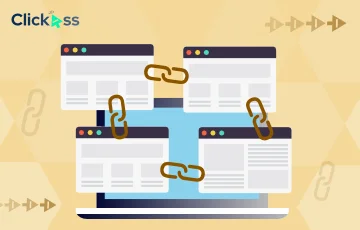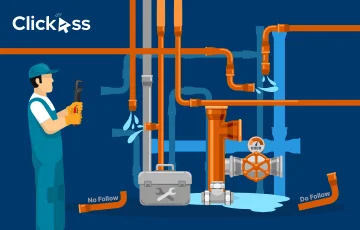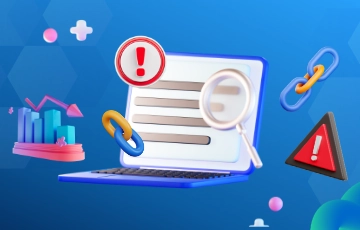⏰ 60-Second Summary
- It’s not about “selling links”—it’s about framing the offer: You’ll get better clients (and bigger payouts) when you stop saying “backlinks for sale” and start pitching “strategic placements” or “editorial partnerships.”
- You can monetize without Google slaps: With relevance-first placement and capped outbound links, you can stay compliant and cash in.
- One weekly link = $1K/month potential: You don’t need hundreds of placements. Even one well-placed backlink each week can add up to $12K+ a year if your site has the right niche and traffic.
Backlinks are still the currency of SEO.
The more reputable sites that link to yours, the better your odds of ranking higher. That’s why businesses, agencies, and even solo founders are constantly hunting for quality backlinks—and why people are willing to pay good money for them.
Selling backlinks today doesn’t mean joining shady link farms or getting flagged by Google. It means knowing how to do it right: transparently, ethically, and at scale.
We’re breaking down 10 practical, legal-adjacent ways to sell backlinks and make real money—without setting your site on fire.
And yes, it’s possible to pull in $30K a year doing it the smart way.
Is Selling Backlinks Legal or Ethical?
Selling backlinks isn’t illegal, but it does fall into a gray area when it comes to search engine guidelines. It all comes down to how you handle it—transparently or recklessly.
Google’s Stance on Selling Links
Google explicitly discourages selling links that are meant to manipulate search rankings. Paid links should always be labeled using attributes like rel=”sponsored” or rel=”nofollow”.
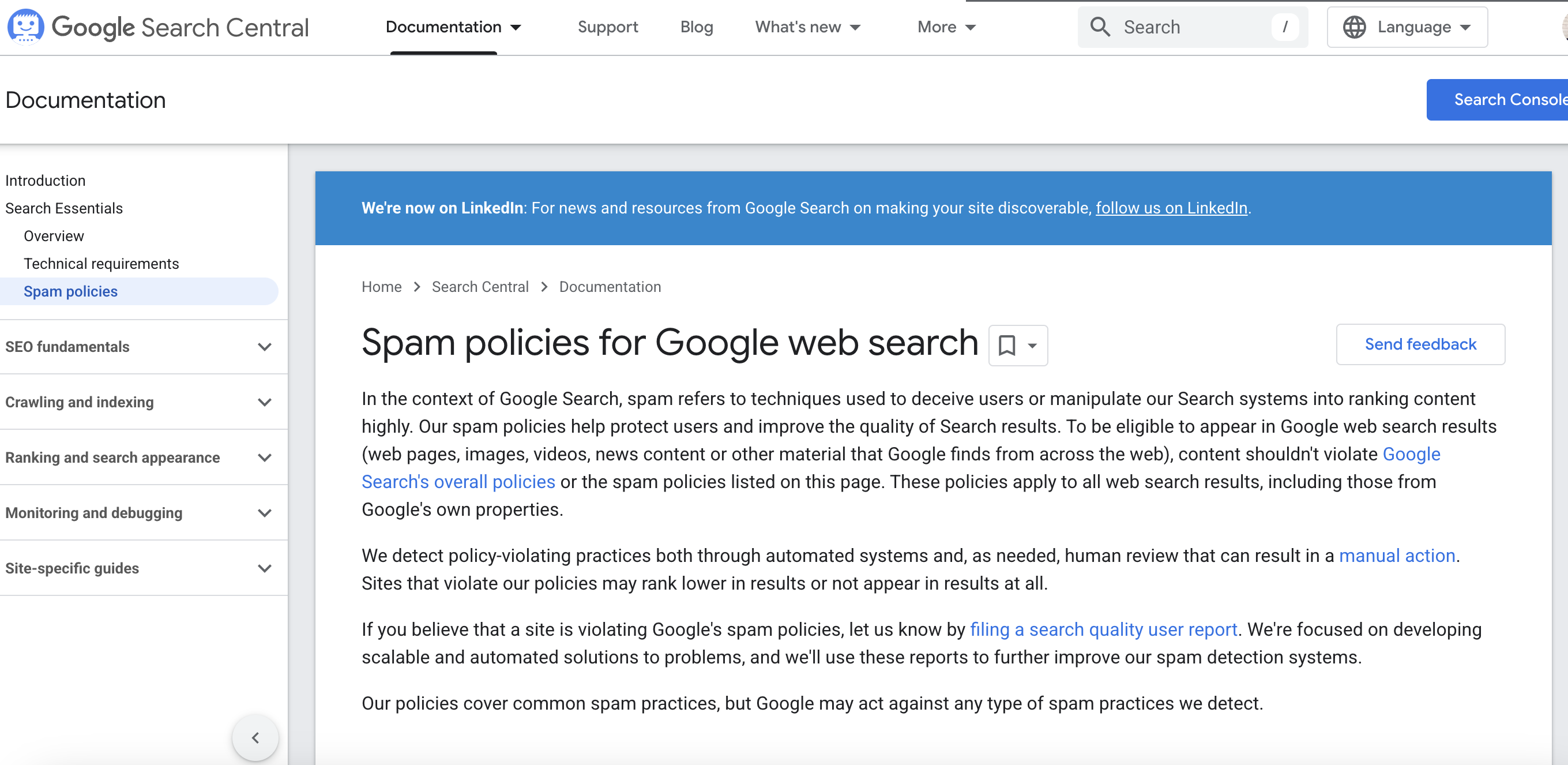
Ignoring this could result in a drop in search visibility, loss of organic traffic, or, in extreme cases, a manual penalty.
The Risk-Reward Equation
There’s no denying that backlinks are in demand, and high-authority websites can charge a premium. But that potential revenue comes with its own risks.
Selling too many links, doing it in bulk, or working with low-quality buyers can trigger red flags. Profit is possible—but not without limits. Selling a few relevant, well-placed backlinks is very different from running a link farm.
How to Stay White-Hat While Earning
If you want to sell backlinks without burning your site’s credibility, you need a system that balances profit with compliance.
Here’s how to keep it clean and stay off Google’s radar:
- Use proper link attributes: Always add rel=”sponsored” or rel=”nofollow” to paid links. This signals that the link is promotional and ensures you’re not passing PageRank.
- Work with relevant, trusted partners: Avoid linking to sketchy websites or irrelevant niches (like casinos, crypto scams, etc.). Relevance and site quality matter—Google also considers the context and not just the link tags.
- Limit outbound links: Too many outgoing links on a single page, especially if they’re all to external domains, can make your site look like a link farm. Keep the ratio balanced with internal links.
- Don’t accept every offer: Saying “yes” to every backlink deal that lands in your inbox is a fast way to tank your site’s trust signals. Be selective. Vet your buyers.
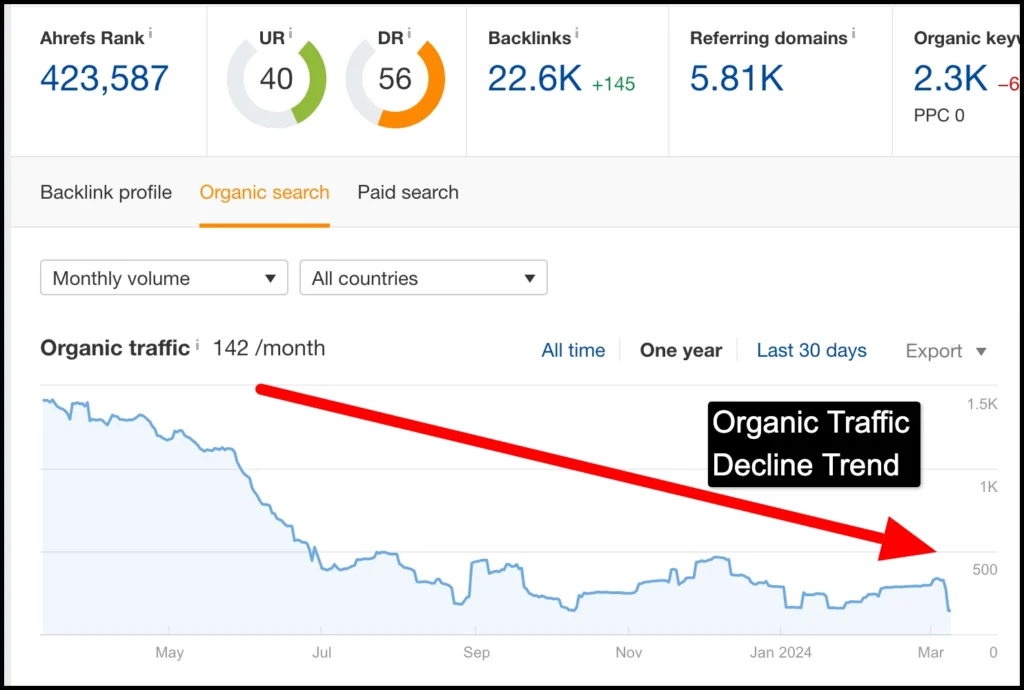
- Avoid mass link placement: Spreading dozens of paid links across multiple pages in a short period is a red flag. If you’re monetizing, do it gradually.
- Keep your content’s value first: Make sure the surrounding content is strong, original, and valuable to readers. Don’t publish thin or low-effort articles just to push a link.
📚Also read: Nofollow vs. Dofollow Backlinks: Understanding Their SEO Implications |
Selling Backlinks: How Much You Can Earn?
The income potential from selling backlinks can be surprisingly high—especially if your site has decent traffic and a solid Domain Rating. On average, guest posts sell for around $220, while link insertions go for $141.
Here’s the formula to calculate your earnings from backlinks:
Monthly Link Value = Organic Traffic Value ÷ Referring Domains Lifetime Link Value = Monthly Link Value × 24 months Please note that: We multiply the monthly value by 24 to calculate the “lifetime link value”—a reasonable timeframe during which a link continues to pass SEO value before it drops off the web due to redesigns, expired domains, or site structure changes. |
For example, let’s look at the backlink profile of the site Nerdwallet:

As per the above data, we can see that:
- Organic Traffic Value: $44.3M
- Referring Domains: 100K
Now let’s use this data in the above formula:
Monthly Link Value:
- $44.3M ÷ 100,000 = $443 per link/month
Lifetime Link Value:
- $443 × 24 = $10,632 per backlink
🧠 What This Tells Us:
If someone gets a backlink on NerdWallet (and it performs on par with their current averages), that link would theoretically be worth over $10K across two years.
That’s not saying NerdWallet charges this, but it helps justify high-end backlink pricing in personal finance. It’s also a benchmark for what kind of ROI top-tier backlinks can generate.
10 Proven Ways to Sell Backlinks and Earn $30K/Year
If your site has traffic, authority, or niche relevance, there’s money on the table.
Here are 10 smart, scalable ways to sell backlinks without burning your domain’s reputation:
1. Position Your Service Differently
If you go out saying, “I sell backlinks,” you’re not getting taken seriously—and you’ll likely repel your best clients. The smarter move is to reposition your offer into something that sounds strategic, results-driven, and aligned with business goals.
Think editorial outreach, guest content partnerships, or what we did with Clickass, branding us as SaaS link building experts focused on BOFU (Bottom of Funnel) MarTech backlinks.

Instead of selling links, we offer tailored, high-authority placements through “manual outreach,” which is just a better way of packaging link selling into a premium service. This kind of branding not only bypasses the stigma of black-hat tactics—it also gives you room to charge more.
📚Also read: Link Building Outsourcing: The Definitive Guide [2023] |
2. Offer Link Placement Services on Existing Articles
One of the easiest ways to monetize your content is by offering contextual link placements inside blog posts you’ve already published.
If you’ve been writing content for a while, chances are you’ve got dozens of articles ranking for niche keywords.
Buyers are constantly looking for pages that already have authority and traffic because a link there carries more SEO value.
You don’t need to create new content or write guest posts. Just update an existing article and insert a relevant backlink where it fits naturally. Tools like Ahrefs can help you spot which pages are pulling in traffic and which keywords they rank for.
For example:

3. Create a Resource Page with External Link Slots
List-style resource pages are gold mines for backlink monetization—especially when they rank for high-intent keywords like “best tools for freelancers” or “top SaaS SEO software.”
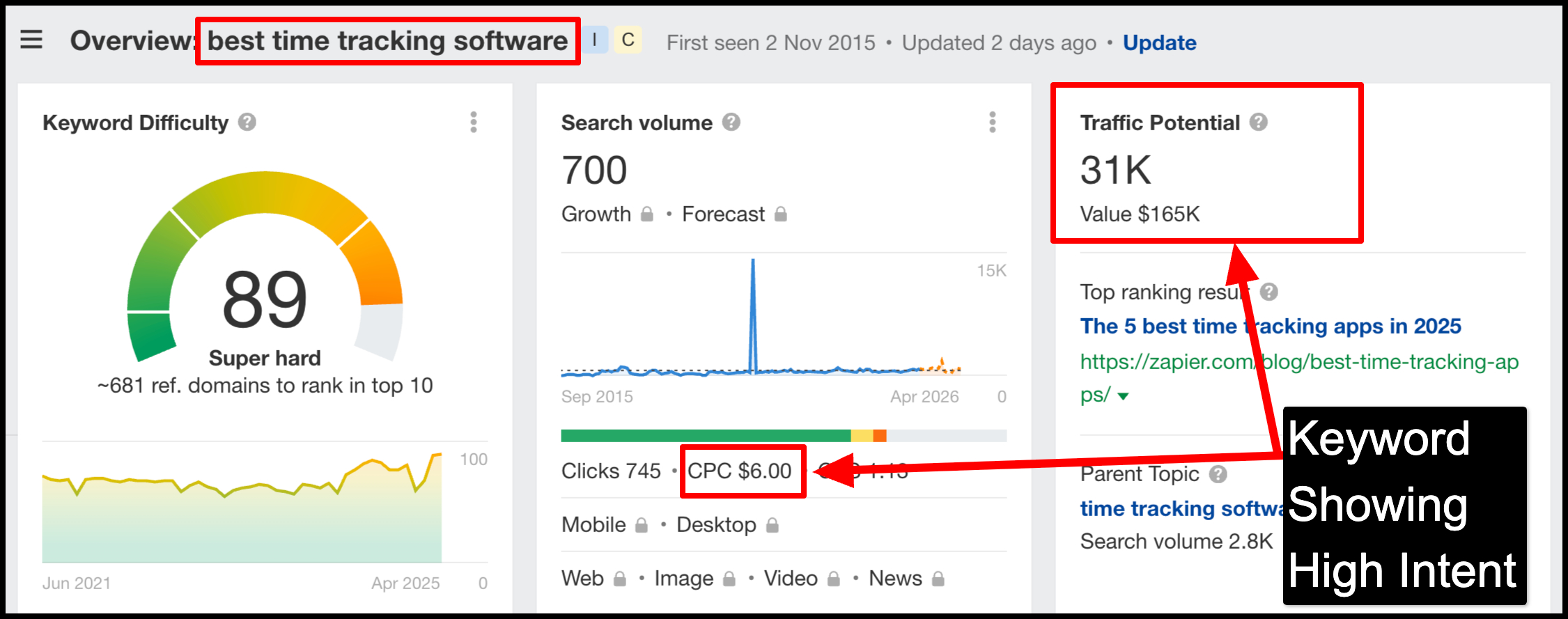
These pages attract traffic from users actively looking for solutions, which makes them incredibly appealing to companies in that space.

Once your listicle starts ranking and getting consistent traffic, you can charge for inclusion—either as a one-time fee or a recurring placement cost.
4. Partner with SEO Agencies as a Backlink Vendor
If your site has good metrics and niche relevance, SEO agencies will want to work with you—especially if you’re offering reliable placements they can white-label to their clients.
This turns you into a backlink vendor, and it’s one of the most stable ways to monetize long-term.
Agencies are always on the lookout for link partners they can trust for repeat orders. Some prefer fixed-rate placements, while others will negotiate bulk pricing (e.g., 10 links/month at a discount).
The goal is to make it frictionless for the agency: clear rates, consistent turnaround, and high editorial standards.
💡 Look at how Clickass positions its SaaS-focused link services. Instead of selling links randomly, we work with agencies and brands through structured campaigns with outcome-based planning. That’s what separates a vendor from a spammy seller: process, consistency, and specialization.
For instance, our campaign with Kualitee, a software testing platform, resulted in a 25% boost in organic traffic by strategically placing links on niche sites, enhancing their visibility and search rankings significantly.
5. Sell Guest Post Opportunities on Niche Sites
If you run a blog in a tight niche, your site already has something most link buyers want: contextual relevance. Selling guest post slots allows you to monetize that authority without sounding like a paid link factory.
Set clear pricing tiers based on Domain Rating (DR), traffic, or topic complexity.
For example:
- DR 30–40 could start at $100
- DR 50+ might fetch $250+
Add extra for content writing if they want you to handle it.
6. Sell Links Through Backlink Marketplaces
If you want steady link sales without chasing down leads, list your site on backlink marketplaces.
These platforms connect website owners with buyers looking for placements—usually guest posts or link insertions.
It’s more hands-off than agency partnerships and works well if you prefer volume over high-margin custom deals.
Some of the popular marketplaces include:
Marketplace | Focus/Niche |
General SEO, high-authority backlinks placements | |
White-hat links, general niche focus | |
Automated outreach and guest posts | |
Link insertions and guest posts | |
Marketplace for backlinks across niches | |
Tech, SaaS, digital services | |
PR campaigns, media outreach | |
Lifestyle, finance, crypto, B2B |
📚Also read: Everything You Need to Know About Link Farming |
7. Create a Content Marketing Funnel
If you’re serious about scaling link sales, don’t rely solely on marketplaces or cold outreach.
Build a content marketing funnel that pulls in inbound leads and moves them closer to buying—on autopilot.
Funnel Stage | Audience Intent | Content Examples | Purpose |
Top-of-Funnel (ToFu) | Awareness – exploring backlink-related topics, not ready to buy | “Why Backlinks Still Matter in 2025”, “How Guest Posts Impact SaaS SEO” | Attract traffic and introduce backlink value |
Middle-of-Funnel (MoFu) | Consideration – evaluating options and potential services | Case studies, link-building breakdowns, pricing guides | Build trust and position your services as the solution |
Bottom-of-Funnel (BoFu) | Conversion – ready to take action or request a quote | Link packages, white-label options, outreach services, lead magnets like pricing sheets and templates | Drive conversions and collect qualified leads |
📚Also read: Tiered Link Building: Everything You Need to Know |
8. Curate Newsletter Sponsorships with Link Mentions
If you run a newsletter with decent open rates, it’s prime real estate for contextual link mentions.
Instead of traditional ad banners, offer sponsored content placements—short blurbs with natural backlinks embedded into the message.
This works especially well in niche newsletters with engaged readers (think SEO, SaaS, or marketing).
Use UTM parameters to track click-throughs and conversions so sponsors can see results.
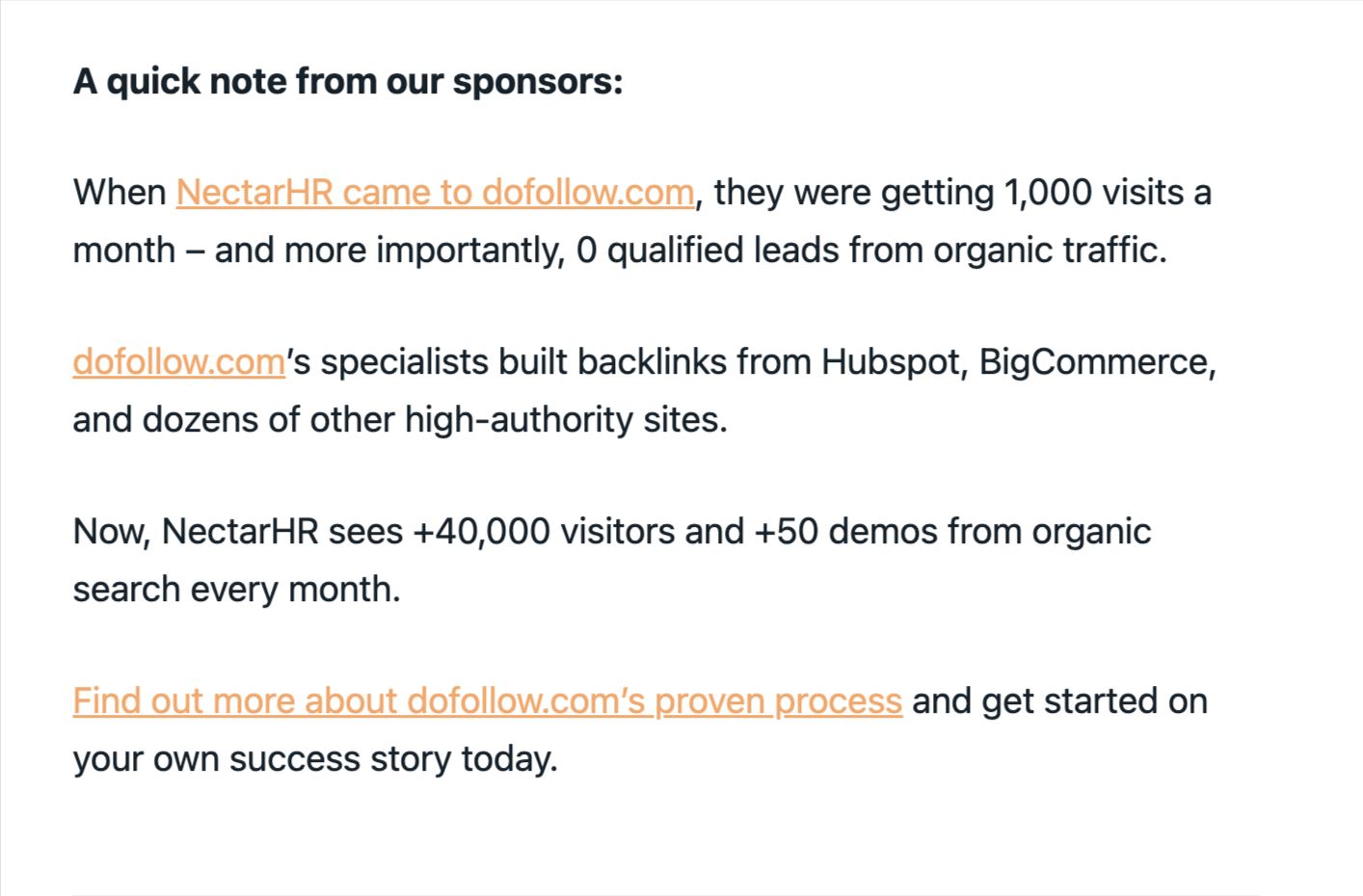
Platforms like Substack, ConvertKit, or Beehiiv make this easy to set up. Over time, you can package these placements as part of your overall link building offering.
9. Offer Content Insertion on Relevant Blog Pages
Content insertion is the low-effort, high-margin sibling of guest posting.
Instead of publishing new articles, you offer backlink placement inside existing blog posts—as long as the context fits naturally. This works best on evergreen content that already ranks and has consistent traffic.
Let’s say you have a blog post on “Best Tools for Remote Teams.” A project management SaaS company might pay for a link mention embedded in a paragraph like: “Tools like Trello and [Company X] simplify remote task coordination.”
Use internal guidelines to maintain content quality—limit outbound links, avoid obvious ads, and always check for topical fit.
Insertion links tend to convert better when they’re part of a narrative, not tacked onto a list.
10. Start a Paid Community or Forum with Link Access
Instead of blindly selling backlinks, build a gated community where members can earn link placement through value-based participation.
Think private Slack groups, Discord servers, or forum-style platforms.
Members join to network, share insights, and—when relevant—drop links inside curated threads or discussions.
You can monetize through membership tiers:
- Base access for conversation
- Pro access to post content with links
- Agency access for promoting client links under guidelines
Example: Traffic Think Tank (now part of Ahrefs) allowed link drops—but only in designated areas and with clear relevance. Using tools like Circle, Discord + LaunchPass, or Memberstack makes launching very simple.
📚Also read: What is Link Equity, and How Is It Determined? |
Tools to Manage and Sell Backlinks Efficiently
Scaling a backlink selling system means more than just finding buyers—it includes managing links, tracking placements, and keeping communication sharp.
Here are some tools that’ll help you with your backlink management strategy:
1. Link Management CRMs
Keeping track of link placements, anchor texts, renewal dates, and buyer details can get messy fast.
That’s where link CRMs come in.
- Airtable: Airtable is a favorite for link sellers who need flexibility. It’s essentially a supercharged spreadsheet with built-in automation, reminders, and integrations. You can create views for pending placements, renewals, or site metrics—perfect for keeping operations clean at scale.
- Backlink Manager: Specifically built for SEO professionals, this tool tracks link status, sends automated follow-ups for broken links, and lets you collaborate with clients or vendors. Great for agency setups or multi-site sellers.

2. Prospecting Tools
If you’re doing direct outreach, these tools make the process scalable without sounding like a robot.
- Pitchbox: A robust platform for building outreach campaigns, automating follow-ups, and personalizing at scale.
- Hunter: Find verified emails quickly using domain-level search, ideal for reaching out to site owners or agencies.
Want a deeper dive into how to streamline outreach and find the right link targets? Check out this link prospecting guide for proven tactics and tool setups.
Legal + SEO-Safe Practices to Follow
Selling backlinks can absolutely get you nuked from search results if done carelessly.
If you want to earn from link placements without tanking your domain, follow these baseline rules to keep things ethical, SEO-friendly, and under the radar.
- Adhere to Google Guidelines: Google’s spam policies are clear: any link intended to manipulate rankings is risky territory. If you’re selling placements, always mark them with rel=”nofollow” or rel=”sponsored” and disclose them where needed. That said, this isn’t the only rule. Avoid link stuffing, maintain quality editorial standards, and don’t engage in schemes designed purely to game search engines. If it feels manipulative, it probably is.
- Avoid Mass-Link Selling Schemes: Once you start posting on every marketplace and stuffing links into random pages, your site turns into a link farm. And once buyers realize that? Game over. Stay selective.
- Keep Backlink Placements Relevant and Natural: Only insert links where they genuinely add value. Force-fitting links into irrelevant posts is how you end up flagged—or worse, ignored by serious buyers.
- Ethical Pricing: Price based on value, not hype. If your DR is 30, don’t act like you’re TechCrunch. Overcharging burns bridges fast and ruins repeat business.
- Establish Ground Rules: Set clear internal standards: max 2 paid links per post, no gambling or shady niches, and a vetting process for all link requests. This helps protect your brand, domain authority, and buyer trust.
Ready to Sell Links Without Losing Sleep?
Selling backlinks can be incredibly profitable—but only if you play it right. The goal is to build a consistent, long-term revenue stream by offering real value to buyers, staying under the radar, and protecting your own domain’s credibility in the process.
💌 Stay Ahead in the Backlink Game
Want more proven ways to monetize your site, land high-ticket link deals, and avoid Google penalties?
Subscribe to our newsletter and get weekly insights on link selling, SEO strategies, and real SaaS case studies — straight to your inbox.
👉 No fluff. Just actionable tactics that work in 2025.
About The Author
Sanjoli Jain
Content writer and strategist with over 5 years of experience helping SaaS brands grow through research-backed storytelling and SEO. I enjoy unpacking dense SEO topics and shaping them into content that moves the needle. You'll always find me chasing the sweet spot between clarity, strategy, and search performance.
Table of Contents
ToggleRelated Posts
SaaS Link Building Playbook for Faster SEO Wins
How to Choose the Right White Label Link Building Partner for Your SaaS SEO Agency
Forum Backlinks in 2025: Strategy, Risks & Truth
13 Cold Email Tweaks That Improved Backlink Outreach (Backed by Experts)
Domain Rating vs Domain Authority – What SEOs Should Focus On
Leading White Label Backlink Services: Ranked & Reviewed
Relevant Links Guide: Master Contextual Backlinks Today
Manual Link Building in 2025: A Human-First Guide
Contextual Link Building in 2025: A Practical SEO Guide That Works
Mastering International Link Building in 2025
Beyond DR: Real Link Building Metrics That Actually Work
10 Proven Ways to Sell Backlinks and Earn $30K a Year
How To Earn Natural Backlinks Without Cold Emails
The Ultimate Guide to Organic Link Building in 2025: Future-Proof Your SEO
Top AI-Powered Link Building Trends for 2025 [From 15 Experts]
Link Prospecting Guide: Find High-Quality Backlinks
Inbound Link: What it is & How It Affects Your SEO Rankings?
Backlink Management Guide: Unlocking Top Tools and Strategies
CTR Manipulation: Discover Ethical SEO Alternatives
Niche Relevant Backlinks: Comprehensive Guide (2025)
White Label Link Building 101: A Guide for SEO Agencies
10+ Niche Driven SEO Strategies to Boost Your Traffic & Revenue
How to Check Who Links to My Site Or Any Site for Better SEO?
What Are Editorial Links? (+ How to Earn Them)
Link Building Checklist (2025): Smart Strategies for SEO Pros
20+ Link Building Benefits for SEO Mastery and Growth
Unlocking the Power of Reciprocal Links in 2025: Strategies for SEO Success
13 Link Building Challenges & How to Overcome Them
16 Link Building Mistakes to Avoid in 2024
What Are PBN Backlinks? (And Why You Shouldn’t Use Them)
Analyzing Your Backlink Profile for SEO & 2 Perfect Examples
10 Ways to Index Backlinks Faster in 2024
Nofollow vs. Dofollow Backlinks: Understanding Their SEO Implications
Tiered Link Building: Everything You Need to Know
What is Link Equity and How Is It Determined?
Link Building 101: Master The Basics and Beyond
The Power of Backlinks: Why They Are Essential for SEO Success
Link Insertion: How to Do it with $0 Investment?
Everything You Need to Know About Link Farming
9 Underrated Techniques to Get High Authority Backlinks in 2024
Doorway Page Explained: Ultimate Effects on SEO And Rankings
Top of Funnel Marketing For SaaS: Strategies, Measurement, and Examples
Link Building Outsourcing: The Definitive Guide [2023]
8 Cost-Effective Ways to Get You Higher Search Engine Rankings
An Ultimate Guide to Growth Marketing





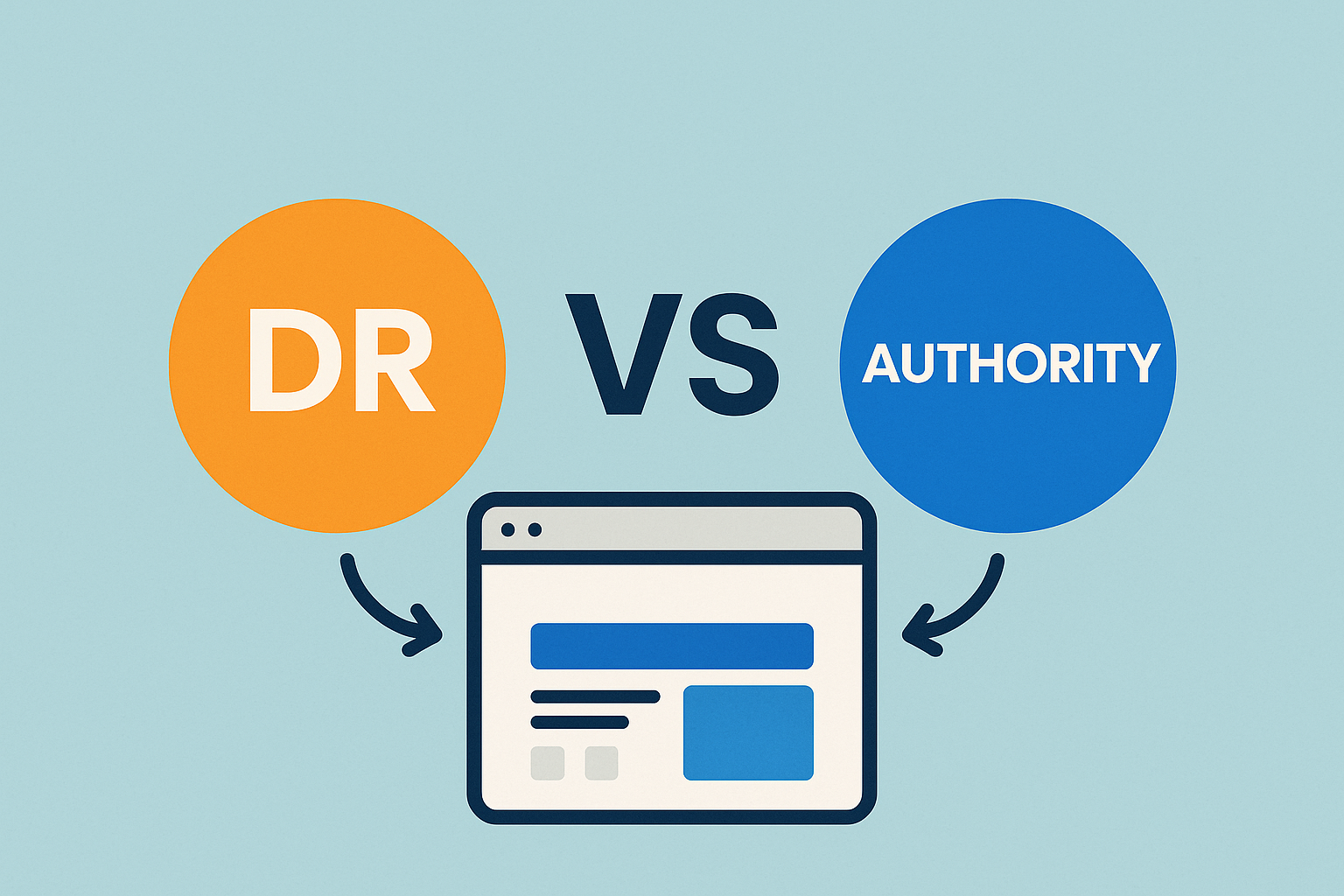



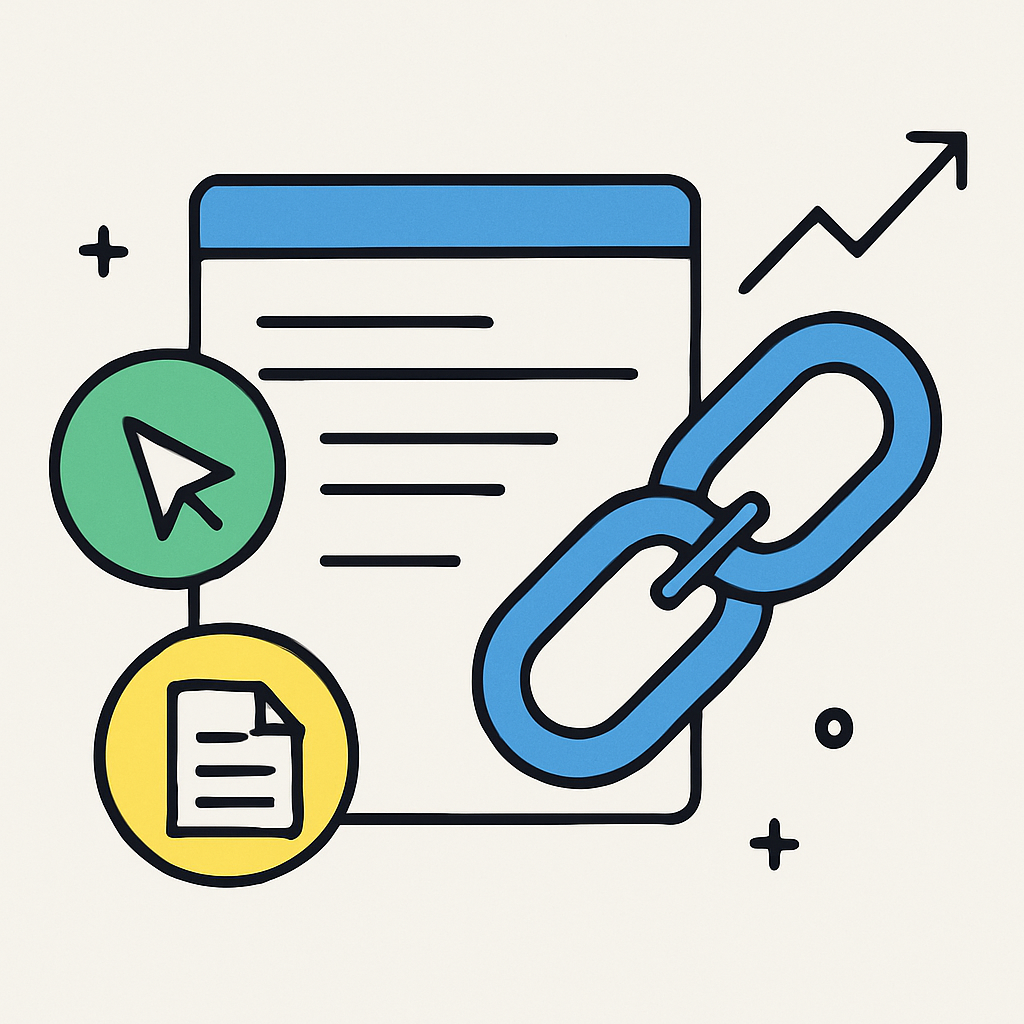


















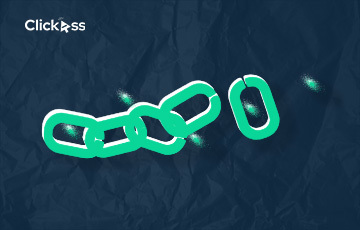


![Backlink Profile: Analysis + [2 Perfect Examples]](https://clickass.io/wp-content/uploads/2024/01/Examples-of-Perfect-Backlink-Profile3-1.webp)
